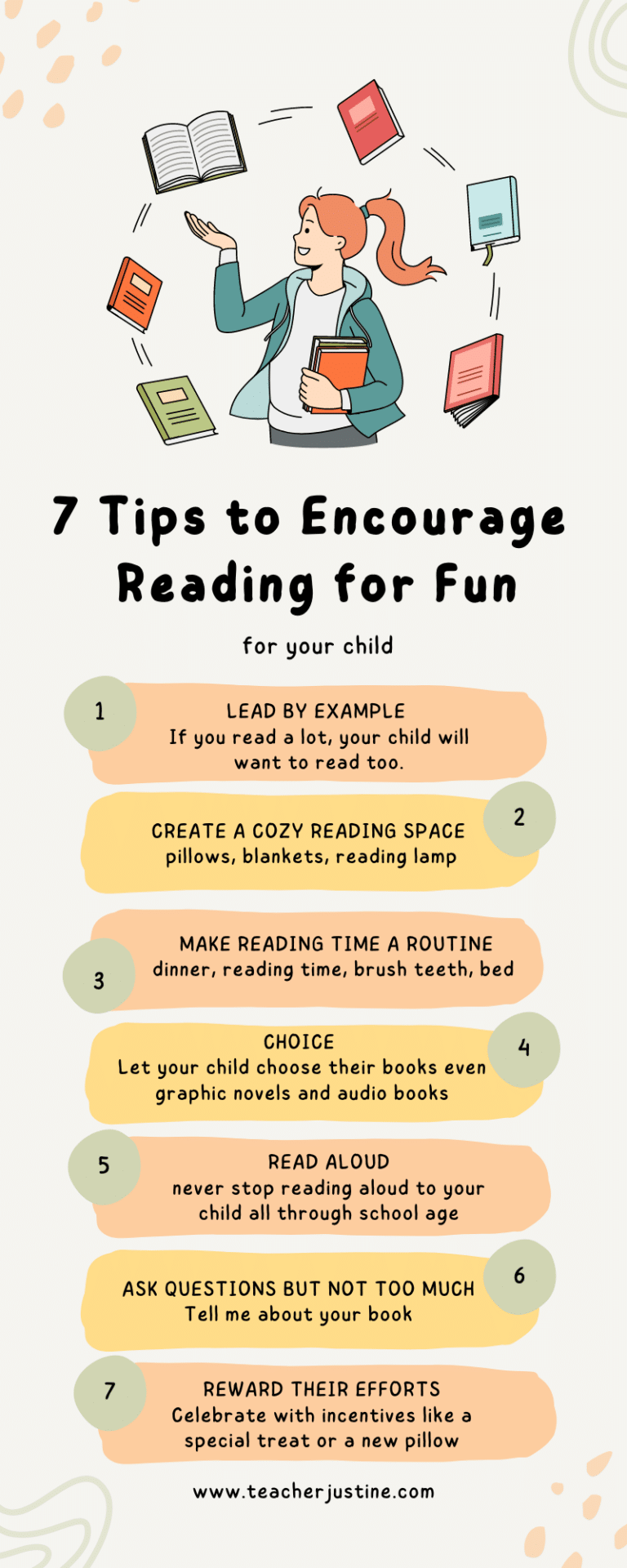Teacher Justine contains affiliate links and is a member of the Amazon Services LLS Associates Program. If you make a purchase using one of these Amazon links, I may receive compensation at no extra charge to you. See my disclosure policy for more information.
How to Get Your Child to Love Reading
Discover how to get your child to love reading daily for fun
Parents of my students often ask me how they can get their children to love reading. They themselves love reading and they want their child to love reading for pleasure too. They remember reading voraciously as a child and want this for their child too.
However, many kids these days do not love reading. It is easy to blame technology and the internet. There are so many ways for children to get information and entertainment online that it seems like reading a book can’t compete. But there is hope.
Try this One Thing to develop a love of reading in your child and soon watch them devour books daily for fun.
The One Thing is not moving to a log cabin in the middle of nowhere with no internet and nothing to do but read. Although this is also a good idea.
The one thing is: Keep reading books to your children
Keep reading to your children long after they are too big to sit in your lap. Continue to read aloud to them to get them to love reading even after they have learned to read. Keep reading to them all through elementary school. And if you can, keep reading to them in middle school and high school.
This might sound crazy but hear me out.
The class read aloud is disappearing
Teachers used to read books to their students throughout all the grades. Now many of them don’t because they feel pressured to meet the standards. They feel there is not enough time to prepare their students for these assessments. And they are feeling even more pressured now to catch students up from the pandemic induced learning loss.
When you ask older students what their favorite memory from school is, it is often listening to their teacher read a book aloud to them every day. This is what got them to fall in love with storytelling and to love reading. Teachers say their students used to ask them for more titles like the one they read aloud so that they could keep reading for fun.
The class read aloud has strings attached
Teachers do still read aloud to their students, but they have expectations beyond just listening for pleasure. It is not enough to immerse yourself in another time and place, getting caught up in the characters’ lives wondering what is going to happen next. You are also expected to take notes and analyze the story in your notebook as you listen.
This focus on close reading and analysis has caused many teachers to not read the whole story or finish the book. They focus on small parts for deep analysis. In her article Why Kids Aren’t Falling in Love with Reading Katherine Marsh shows there is nothing that kills reading for fun more than constant analysis. Especially when you don’t even finish the story.
Read How to Become a Better Reader of Fiction
As I said in another blog, to develop a love for reading, you need to be able to enter into the story, make friends with the characters, explore their landscape. Only after you have done this and finished the book should you start thinking about analyzing it.
I’m not saying analysis is totally bad. A really good book will stay with you and you will naturally start thinking about it over and over. But forced literay analysis before you have finished the book will kill your child’s love for reading.
Therefore, since the class read aloud is disappearing, it is even more important than ever that you read aloud to your child to make them love reading for fun.
How does reading to children make them love reading?
Reading to your child makes them fall in love with storytelling. By listening to stories your child becomes friends with the characters and gets caught up in the plot. They want to know what will happen next. Will the characters get what they want, or will another excruciating conflict keep it just out of reach? Your child has to listen to or read the whole book to find out. The reward is feeling emotionally satisfied with the ending.
Read alouds also help your child love reading because they are exposed to stories that they can’t read on their own yet. Parents often think that once a child learns to read, the child should read to them to practice. This is important, but not at the expense of no longer reading to your child. If you always make them read, they will start resisting and begin to hate reading.
List of 100 great books for read alouds
If you need help finding great read alouds, download my list of 100 Favorite Books for Read Alouds. I compiled this list from teachers and students who shared their favorite books in a Facebook post on Kate DiCamillo’s page. Most of the books are appropriate for 2nd-6th grade. Some are for younger students, and a few are for upper middle schoolers.
Reading aloud gives children access to more interesting stories
Many of the books that younger children are able to read on their own are too simple and don’t have an interesting plot to really hook them and make them love reading. But when you read aloud to them, you can pick a book with interesting characters and an exciting plot that will help your child fall in love with storytelling.
Also, many stories written for children to read on their own contain an obvious message. The message is good, like be nice and include everyone, but the story is often not interesting, and the books are boring. In a good story, not everyone is nice, and the message isn’t always so obvious.
In addition, many classic books are being pulled from school libraries in some areas. And some books are being rewritten to remove offensive language to the modern reader. However, you should still be able to find the originals.
Reading aloud creates a special connection with your child
One of my favorite memories is being a child in third and fourth grade when my father used to read chapter books to my older sister and me every evening after dinner. We sat at the dining room table and listened to him read books that he chose.
I was exposed to books that I wouldn’t have been able to read yet on my own. And I was exposed to books that affected me. Stories that made my heart pound by the suspense and made me laugh and cry.
I will never forget sobbing as the boy’s dog goes missing and his father is arrested in Sounder. Or feeling the outrage and injustice of everything in Freedom Road. And the feeling of joy when the swan overcomes his disability in The Trumpet of the Swan.
If you can insert reading aloud to your school age child every day in your routine, you will create a special bond with them and you will get them to love reading daily for fun.

Read alouds develop a love of reading in both struggling and skilled readers
Struggling readers often don’t like reading because the act of looking at strings of letters on the page and turning into words you can hear in your head and images you can see in your mind is difficult. Struggling readers will often give up before they are able to get into the story.
The simple view of reading says that reading comprehension has two parts. Word recognition times oral language comprehension equals reading comprehension. If you are weak in either of these two parts, reading will not be easy or rewarding.
But reading aloud to a struggling reader solves this problem and allows them to fall in love with storytelling. Then, with systematic instruction, they can retrain their brains to make word reading easier and develop a love of reading words on the page.
Read alouds teach fluency for all readers
When you read aloud to your child, you are modeling and teaching fluency. Even children who decode very well can be weak in fluency when reading aloud. By listening to adults read with proper phrasing and rate, they will learn to read more fluently too. Fluency is the bridge from word recognition and oral language comprehension to reading comprehension. Without fluency, it is very difficult to understand the text.
Read alouds teach vocabulary and background knowledge
When you read aloud to your child, you will be able to stop and talk about new and interesting words. This is a great way to learn new vocabulary. You will also stop and talk about the greater context of things in the book. This is a natural way to learn more background knowledge that will help them when they are reading on their own.
Will you try Read Alouds to get your child to love reading?
Since parents are always asking me how they can get their child to love reading, I originally was going to write about 7 tips to encourage your child to read (see infographic above). But as I was writing, I realized that if we want to encourage kids to read on their own, we first need them to love stories. To love stories, we need to bring back the read aloud.
If teachers have fewer opportunities for the class read aloud, then let’s read more to our children at home so that they will love reading again. Don’t forget to download the list of 100 favorite books of teachers and students!
